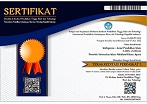ANALISI KEBIJAKAN KURIKULUM PENDIDIKAN AGAMA ISLAM DI MADRASAH: Analisis Keputusan Menteri Agama Nomor 183 Tahun 2019
Abstract
Education is a system, so in the work process education must have core components so that it can run as it should. One of the main components of the education system is the content or educational materials. Educational content/materials need to be arranged in such a way as to be called an educational curriculum. The curriculum is a set of plans and arrangements regarding the objectives, content, and learning materials as well as the methods used as guidelines for the implementation of learning activities to achieve the objectives. In formulating the objectives of a curriculum, it must be related to the educational goals to be achieved. In addition, a curriculum compiled or developed cannot be separated from its background and foundations. This article discusses the background and foundations of developing Islamic religious education curriculum in madrasas which are the contents of the Decree of the Minister of Religion Number 183 of 2019. The study was carried out with a content analysis approach regarding the concept or theory stated, then explored more deeply or more broadly to obtain clarity of understanding. The author finds the historical background in the form of challenges that are internal and external to the condition of national education, especially the condition of Islamic religious education in madrasas which is the background for developing Islamic religious education curriculum. Likewise, the existing background contains logical consequences for compiling the foundations of thought as the basics, the footing on which the structure of the Islamic religious education curriculum at the madrasa stands.
Full Text:
PDFReferences
Al Fata, M. T. (2015). Manisfestasi Budaya dalam Pendidikan Islam: Membangun Intelektualisme Budaya dengan Nilai-Nilai Pendidikan Islam. Epistemé: Jurnal Pengembangan Ilmu Keislaman, 10(2), 291–316. https://doi.org/10.21274/epis.2015.10.2.291-316
Alhamuddin. (2016). Kurikulum Pendidikan Tinggi Keagamaan Islam : Mutu dan Relevansi. Al-Murabbi, 3(1), 1–15.
Al-Rasyidin. (2008). Falsafah Pendidikan Islami: Membangun Kerangka Ontologi, Epistemologi, dan Aksiologi Praktik Pendidikan. Bandung: Citapustaka Media.
Dewey, J. (1961). Democracy and Education. New York: The Macmillan Company.
Dikdas, P. (2020). Kemendikbud Sederhanakan Kurikulum Pada Satuan Pendidikan Selama Masa Pandemi. Diambil 15 April 2021, dari http://pgdikdas.kemdikbud.go.id/read-news/kemendikbud-sederhanakan-kurikulum-pada-satuan-pendidikan-selama-masa-pandemi
Direktorat KSKK Madrasah. (2019). Keputusan Menteri Agama Nomor 183 Tentang Kurikulum PAI Dan Bahasa Arab Pada Madrasah. Jakarta: Dirjen Pendis.
Djuwaeli, M. I. (1988). Pembaruan Kembali Pendidikan Islam. Ciputat: Karsa Utama Mandiri.
Ekaningrum, I. R., Widodo, J., Wasino, & Sugiyo. (2018). Development of Curriculum Management Model Based on Multicultural Character in Pesantren Khalafiyah. The Journal of Educational Development, 6(1), 9.
Husna, U., & Thohir, M. (2020). Religious Moderation as a New Approach to Learning Islamic Religious Education in Schools. Nadwa: Jurnal Pendidikan Islam, 14(1), 199–222. https://doi.org/10.21580/nw.2020.14.1.5766
Idris, R. (2013). Pendidikan Sebagai Agen Perubahan Menuju Masyarakat Indonesia Seutuhnya. Lentera Pendidikan, 16(1).
Junaedi, M., & Wijaya, M. M. (2019). Pengembangan Paradigma Keilmuan Perspektif Epistemologi Islam: Dari Perenialisme Hingga Islamisasi, Integrasi-Interkoneksi dan Unity of Science. Jakarta: Prenadamedia Group.
Junaedi, M., & Wijaya, M. M. (2021). Islamic Education Based on Unity of Sciences Paradigm. Ulul Albab, 22(2), 292–312. https://doi.org/10.18860/ua.v22i2.12031
Kemendikbud. (2020). Rencana Strategis Kementerian Pendidikan dan Kebudayaan 2020-2024.
Kerwanto. (2022). Dasar-Dasar Moderasi dalam Epistemologi Pendidikan Islam Perspektif Al-Qur’an. Jurnal Studi Al-Qur’an, 18(1), 91–110. https://doi.org/10.21009/JSQ.018.1.05
Khunaifi, A. Y., & Matlani, M. (2019). Analisis Kritis Undang-Undang Sisdiknas Nomor 20 Tahun 2003. Jurnal Ilmiah Iqra’, 13(2), 81. https://doi.org/10.30984/jii.v13i2.972
Kosim, M. (2008). Ilmu Pengetahuan dalam Islam: Perspektif Filosofis-Historis. Jurnal TADRIS, 3(1), 121–140.
Madjid, N. (1997). Bilik-Bilik Pesantren Sebuah Potret Perjalanan. Jakarta: Paramadina.
Masnu’ah, S., Khodijah, N., & Suryana, E. (2022). Analisis Kebijakan Pendidikan Islam dalam Undang-Undang No. 20 Tahun 2003 (SISDIKNAS). MODELING: Jurnal Program Studi PGMI, 9(1), 16.
Muhaimin. (2007). Pengembangan Kurikulum Pendidikan Agama Islam. Jakarta: Raja Grafindo Persada.
Muqowim, & Lessy, Z. (2021). Revisiting Islamic Studies : Cementing Bases for Integrating Science and Religion in Islamic Higher Educational Institutions. Jurnal Pendidikan Agama Islam, 18(1), 1–20.
Nurmadiah. (2016). Kurikulum Pendidikan Agama Islam. Al-Afkar : Jurnal Keislaman & Peradaban, 2(2). https://doi.org/10.28944/afkar.v2i2.93
Ramayulis. (2002). Psikologi Agama. Jakarta: Kalam Mulia.
Ramayulis. (2015). Filsafat Pendidikan Islam: Analisis Filosofis Sistem Pendidikan Islam. Jakarta: Kalam Mulia.
Ronald Lukens-Bull. (2010). Madrasa by any Other Name: Pondok, Pesantren, and Islamic Schools In Indonesia and Larger Southeast Asian Region. Journal of Indonesian Islam, 4(1).
Soedijarto. (2008). Landasan dan Arah Pendidikan Nasional Kita. Jakarta: PT. Kompas Media Nusantara.
Tafsir, A. (2010). Ilmu Pendidikan Dalam Perspektif Islam. Bandung: Remaja Rosdakarya.
Tila’ar, H. A. R. (2002). Perubahan Sosial dan Pendidikan: Pengantar Pedagogik Transformatif Untuk Indonesia. Jakarta: PT. Raja Grafindo Persada.
Wijaya, M. M. (2019a). Filsafat Kesatuan Ilmu Pengetahuan: Unity of Sciences Sebagai Format Integrasi Keilmuan UIN Walisongo. Semarang: Fatawa Publishing.
Wijaya, M. M. (2019b). Paradigma Berpikir Guru Pendidikan Agama Islam di Era Disrupsi. Progress, 7(2), 123–147.
Wijaya, M. M. (2020). Relevansi Pendidikan Islam Demokratis Dalam Surat Ali Imran 159. Progress, 8(2), 36–54.
Wijaya, M. M. (2021a). Islamic Education Model in Madrasah in The Perspective of Islamic Education Philosophy. Ar-Raniry, International Journal of Islamic Studies, 8(1), 91–101.
Wijaya, M. M. (2021b). Keutamaan Ilmu Sebagai Landasan Pendidikan Nilai dalam Perspektif Hadis Nabi. JALIE: Journal of Applied Linguistics and Islamic Education, 05(1), 74–93.
Wijaya, M. M., & Budiman, M. (2021). Character Development Based on Hybrid Learning in the Post-Pandemic Era. At-Ta’dib, 16(2), 170–179. https://doi.org/10.21111/at-tadib.v16i2.6736 Available
Wijaya, M. M., & Yusuf, A. (2021). Character Education Management: Analysis of Character-Building. Ta’dibuna: Jurnal Pendidikan Agama Islam, 4(1), 1–11.
Yusuf, A., Wijaya, M. M., Mohdlori, A., Susilo, H., Ansori, M., & Nuryadi, M. (2021). The Role of Personality Psychology in Islamic Religious Education. Islam Transformatif : Journal of Islamic Studies, 5(1), 46. https://doi.org/10.30983/it.v5i1.4271
DOI: https://doi.org/10.34001/intelegensia.v10i2.3705
Article Metrics
Refbacks
- There are currently no refbacks.
Copyright (c) 2022 Intelegensia : Jurnal Pendidikan Islam

This work is licensed under a Creative Commons Attribution-ShareAlike 4.0 International License.
Currently this Journal is Indexed by

This work is licensed under a Creative Commons Attribution-ShareAlike 4.0 International License.











